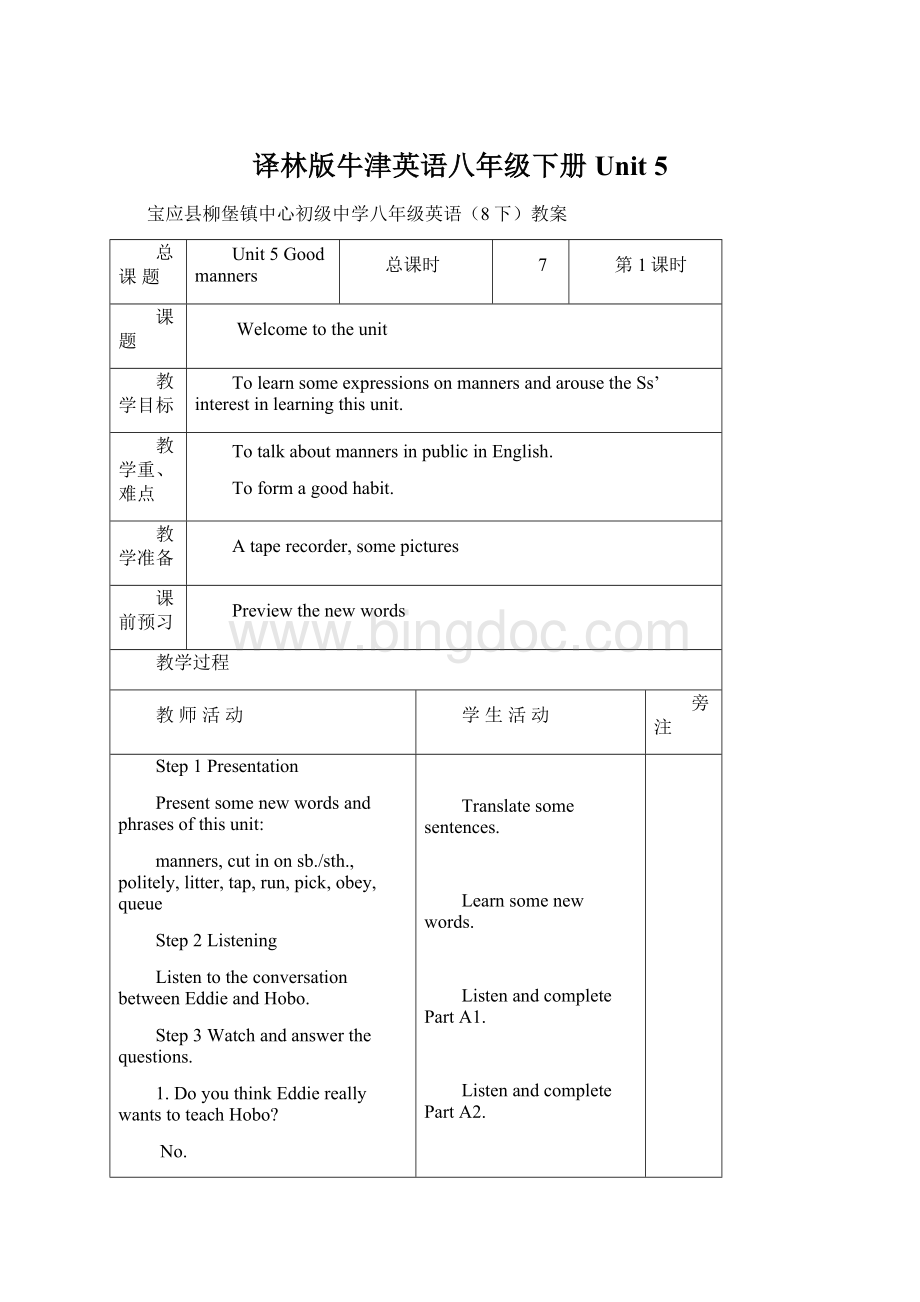译林版牛津英语八年级下册Unit 5Word文档格式.docx
《译林版牛津英语八年级下册Unit 5Word文档格式.docx》由会员分享,可在线阅读,更多相关《译林版牛津英语八年级下册Unit 5Word文档格式.docx(35页珍藏版)》请在冰点文库上搜索。

No.
2.WhatdoesEddieteachHobo?
First,alwayssharethingswithothers.Second,don’tcutinonothers.Alwayswaitpolitely.
3.WhatdoesEddiereallywantfromHobo?
Thecake.
Step4Reading
1.Lookatthepicturesonpage65andanswerthequestions.
1)Whatshouldtheboydowhenhecrossestheroad?
2)Whatisthegirldoing?
3)Whatshouldwedointhelibrary?
4)Whatarethemanandthewomandoing?
5)Whatisthemandoing?
6)Whatdidtheboydo?
2.CompleteAonpage65.ThenaskSstosumupwhatweshouldandshouldnotdo.
Step5ListentoBonpage65andcompletetheform.
ListentotheconversationbetweenAmyandShirley,thencompletetheform.
Step6Pairwork
Givesomepicture.
Workinpairsanddiscusswhatweshouldandshouldnotdoinapublicplace.Usetheconversationasamodel.
Step7Languagepoints
1.You’reoldenoughtolearnaboutmannersnow.
现在够大了可以学礼仪了。
sb.+be+adj.+enoughtodosth.
某人足够……做某事
e.g.Tomisstrongenoughtoliftthebox.
Sheisrichenoughtobuythiscar.
2.You’renevertoooldtolearn.活到老,学到老。
3.droplittereverywhere到处扔垃圾
4.leavethetaprunning没关水龙头
leavev.让……处于(某种状态)
e.g.Don’tleavethetaprunning.
不要让水龙头一直开着。
5.queueforyourturn排队等侯
turnn.轮流,(轮流)的顺序
e.g.Pleasewaityourturn.请等着轮到你。
Step8Exercises
Completetheexercisesonthescreen.
I.Fillintheblanks.
1.Wealllikepeoplewithgoodm_______.
2.C_____inonothersisimpolite.
3.Wemustalwayso____thetrafficrules.
4.Don’tdropl_____everywhere.
5.Q_____herefortaxis.
II.Translation.
1.—我们能在这片森林里吃野餐吗?
—恐怕不能。
—_____we_____________intheforest?
—No,_______________.
2.我们不应该摘公园里的花。
We_______________theflowersinthepark.
3.我们必须遵守交通规则。
Wemust_________________.
Step9Homework
1.Recitethetwoconversations.
2.Rememberthenewwordsandphrasesbyheart.
Translatesomesentences.
Learnsomenewwords.
ListenandcompletePartA1.
ListenandcompletePartA2.
CompletePartA3.
Readaloud.
Learnsomelanguagepoints.
Dosomeexercises.
Dothehomework.
教后感
第2课时
Reading1
1.LearnsomenewwordsontalkingaboutmannersintheUK.
2.Practisereadingskillsbylearningtheconversation.
Toknowthedifferentmannersindifferentcountries.
Toknowsomephrasesinthisclass.
Step1Revision
TranslatethemintoEnglish:
1.随处扔垃圾
2.打断他人
3.在图书馆保持安静
4.在公园摘花
5.遵守交通规则
6.排队等候你的顺序
7.(你)活到老学到老。
8.你现在年龄已大到学习有关礼仪方面的知识了。
9.你不应该任水龙头流水。
10.恐怕不是。
Keys:
droplittereverywhere
cutinonothers
keepquietinthelibrary
pickflowersinthepark
obeytrafficrules
queueforyourturn
You’renevertoooldtolearn.
You’reoldenoughtolearnaboutmannersnow.
Youshouldn’tleavethetaprunning.
I’mafraidnot.
Lookatthepicturesonpage65andtelluswhatweshouldandshouldn’tdointhesepublicplaces.
Step2Newwords
properadj.符合习俗的;
正确的greetvt.问候,打招呼
shakesb’shand与某人握手kissn.亲吻
closeadj.亲密的;
严密的conversationn.(非正式)交谈,谈话
avoidvt.避免subjectn.话题;
主题
behavevt.&
vi.表现publicn.民众,群体
inpublic公开地,在别人面前pushvi.&
vt.推,挤
pushin<
英>
插队,加塞
=<
美>
cutin
bumpvi.&
vt.撞,碰inone’sway挡住某人的路
touchvt.触摸,碰excusevt.原谅,宽恕
excuseme劳驾tillconj.到…时,直到…为止
aswell(as)也,还有loudlyadv.大声地
asconj.正如,如同sayingn.谚语,格言
Romann.罗马人byaccident偶然,意外地
ReadaloudthenewwordsthencompleteB1onpage68.
Step3Warmup
EnjoythevideoandknowsomethingaboutmannersintheUK.
AskSswhethertheyknowthesaying:
WheninRome,doastheRomansdo.
FastReading
Readtheconversationandanswerthequestions:
Whatistheconversationabout?
WhoisDanieltalkingto?
Keys:
GoodmannersintheUK.
Jenny.
CarefulReading
Readtheconversationcarefullyandanswerthequestions.
1.WhatistheproperwaytogreetpeopleintheUK?
2.Whodotheygreetwithakiss?
3.HowdoBritishpeoplestartaconversation?
4.Dotheytalkaboutage?
5.Howdotheybehaveinpublic?
6.AreBritishpeoplepoliteathome?
7.Whatelseshouldwepayattentiontoinpublic?
1.Britishpeoplesay“hello”or“nicetomeetyou”andshaketheotherperson’shandwhentheymeetforthefirsttime.
2.Theyonlygreetrelativesorclosefriendswithakiss.
3.Theytalkabouttheweather,holidays,music,booksandsomethingelse.
4.No,theydonot.
5.Theybehavepolitelyinpublic.
6.Yes,theyare.
7.Weshouldkeepourvoicedowninpublic.
Findthedetailedinformationandfinishthetable.
GoodmannersintheUK
Howtogreetpeople
Howtostartaconversation
Howtobehaveinpublic
Howtobehaveathome
PostReading
ReadtheconversationandthencompleteB3onpage69,thencompleteB2onpage68.
Step5Task
TalkaboutthedifferencesinmannersbetweentheUKandChina.WorkinpairsanddiscusswithyourpartneraboutthequestionsinConpage69.
Step6Homework
Readaloudtheconversationinpairs.
第3课时
Reading2
Toknowsomephrasesandlanguagepointsinthisclass.
What’stheproperwaytogreetpeopleintheUK?
HowdopeoplestartaconversationintheUK?
Dotheybehavepolitelyinpublic?
Britishpeopleareverypoliteathomeaswell,aren’tthey?
Step2Languagepoints:
1.What’stheproperwaytogreetpeoplethere,Jenny?
正确的
e.g.Sheisalwaysproperinherbehaviour.
她的行为总是符合习俗。
2.Britishpeoplesay“hello”or“nicetomeetyou”andshakeyourhandwhentheymeetyouforthefirsttime.
shakesb’shand与某人握手
e.g.Chinesepeopleusuallyshakeyourhandtoexpresstheirfriendliness.
中国人通常用握手来表达友好。
3.Dotheygreetpeoplewithakiss?
greetvt.问候;
打招呼
greetsomebodywith…以……方式跟人打招呼
e.g.Shegreeteduswithasmile.她微笑着跟我们打了个招呼。
kissn.亲吻
4.Butpleaseavoidsubjectslikeage,weightormoney.
avoidvt,避免后面直接跟宾语。
avoid后常跟v.⁃ing形式,构成avoiddoingsth.结构,意为“避免做某事”。
e.g.Youshouldavoideatingsuchunhealthyfood.
你应避免吃这些不健康的食品。
根据汉语意思完成英语句子。
(1)我们必须认真做作业避免错误。
Wemustdoourhomeworkcarefullyto_______________.
(2)王先生设法避免让他的经理生气。
MrWangtriedto_____________hismanagerangry.
avoidmistakes
avoidmaking
subjectn.话题;
e.g.Thisbookincludesmanydifferentsubjects.
这本书包含了许多话题。
5.Dopeopletherebehavepolitelyinpublic?
behavev.表现
e.g.Idonotthinkit'
sproperforyoutobehaveso.
我认为您这样的举止不合体统。
publicn.民众,群体
e.g.Thepalaceisnowopentothepublic.
宫殿现在向民众开放了。
inpublic公开地,在别人面前
e.g.Smokingisnotallowedinpublicplaces.
公共场所不允许抽烟。
6.Theythinkit’srudetopushinbeforeothers.
Itis+adj+(forsb)+todosth.(对某人来说,)做某事……
句型中的it是形式主语,真正的主语是后面的todosth.
e.g.ItisimpolitetoaskBritishpeoplehowoldtheyare.
问英国人多大年龄是不礼貌的。
将下列句子翻译成英语。
(1)学好英语很难。
(2)对孩子们来说,记住这些电话号码很重要。
It’shardtolearnEnglishwell.
It’simportantforchildrentorememberthetelephonenumbers.
pushv.推,挤
和push相对应的词是pull,可意为“拉,拖,拔”。
e.g.Don’tpushthedoor.Pullit,please.不要推门。
请拉开。
pushin插队,加塞美国人常用“cutin”
7.Ifyou’reintheirway,theywon’ttouchyouorpushpastyou.
inone’sway挡住某人的路
e.g.Icouldn'
twalkveryfastbecausealotofpeoplegotinmyway.
我不能走的很快,因为很多人挡了我的路。
touchvt.触摸,碰
e.g.Youcan’ttouchthatthing.
你不能碰那个东西。
8.They’llsay“excuseme”andbepoliteenoughtowaittillyoumove.
excuse既可以作名词,也可以作动词。
作名词时,可意为“借口”;
作动词时,
可意为“原谅”。
e.g.Maryexplainedwhyshewaslate,butwedidn’tacceptherexcuse.
玛丽解释了为什么他迟到了,但是我们没有接受她的借口。
Pleaseexcusehimforarrivinglate.
请原谅他来晚了。
Excuseme.劳驾
Excuseme和I’msorry的用法不同,前者是打扰或麻烦别人的客套用语,后者则是做错事后的道歉用语。
e.g.Excuseme.Canyoutellmehowtogotothepark?
劳驾,你能告诉我如何去公园吗?
I’msorry.Ibrokeyourglassthismorning.
很抱歉,我早上打碎了你的杯子。
9.Britishpeopleareverypoliteathomeaswell,aren’tthey?
aswell(as)也,还有
e.g.IwritemyownsongsandIplaytheguitaraswell.
我唱自己谱曲的歌,也弹吉他。
aswell一般不用否定句,通常放在句末,强调时可放在句中。
either用于否定句,放在句末,之前加逗号。
too语气较轻,多用于口语,在肯定句中使用,通常位于句末。
also比too正式一些,语气较重,只用于肯定句,一般紧靠动词。
10.Justasthesayinggoes,“WheninRome,doastheRomansdo.”
sayingn.谚语;
格言
e.g.MygrandpaknowsalotofEnglishsayings.
我的祖母知道很多英语格言。
WheninRome,doastheRomansdo.
入乡随俗。
英语习语,其省略形式wheninRome也可以表达同样的意思。
Step3Exercise
一、选择合适短语完成句子。
aswellinone’swa